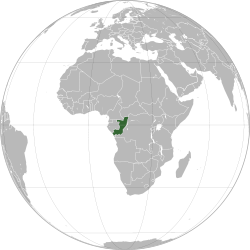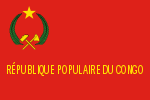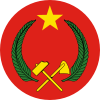- People's Republic of the Congo
-
People's Republic of the Congo
République Populaire du Congo← 
1970–1991  →
→

Flag Coat of arms Motto
Travail, Démocratie, Paix (French)
"Work, Democracy, Peace"[1]Anthem
Les Trois GlorieusesCapital Brazzaville Language(s) French Government Socialist republic,
Single-party communist statePresident Marien Ngouabi Prime Minister Henri Lopès Historical era Cold War - Establishment 1970 - Disestablishment 1991 Currency Central African CFA franc The People's Republic of the Congo (French: République populaire du Congo) was a self-declared Marxist-Leninist socialist state (in other words, a "communist state") that was established in 1970 in the Republic of the Congo. Led by the Congolese Party of Labour (French: Parti congolais du travail, PCT), it existed until 1991, when the country was renamed and the PCT government was eliminated amidst the wave of multiparty reforms that swept Africa in the early 1990s.
Demographics
The People's Republic of the Congo had 2,153,685 people in 1988. There were 15 different ethnic groups, although most people were Kongo, Sangha, M'Bochi, or Teke. 8,500 Europeans were present as well, mostly of French extraction. French was the official language, but other recognized languages included Kikongo and Lingala. Most of the population was centered in urban areas such as Brazzaville. Literacy was 80%, but infant mortality was also high.
History
The People's Republic of the Congo was proclaimed in Brazzaville after a successful coup organized by militant leftists overthrew the previous government. Marien Ngouabi was installed as head of the state and introduced a number of communist policies - such as nationalizing the means of production - two years after the coup. After abolishing the national assembly, Ngouabi formed a Marxist-Leninist party known as the Congolese Labor Party (PCT), which was the sole party of the new state. However, Ngouabi was assassinated in 1977.
Like the other African communist states, the People's Republic of the Congo shared close ties with the Soviet Union.[2] This association remained strong after Ngouabi's assassination in 1977. However, the PCT government also maintained a close relationship with France.[3]
In mid-1991, the Sovereign National Conference removed the word populaire ("People's") from the country's official name, while also replacing the flag and anthem that had been used under the PCT government. The Sovereign National Conference ended the PCT government, appointing a transitional Prime Minister, André Milongo, who was invested with executive powers. President Denis Sassou Nguesso was allowed to remain in office in a ceremonial capacity during the transitional period.[4]
References
- ^ As shown on the coat of arms
- ^ Timeline: Republic of the Congo
- ^ John F. Clark, "Congo: Transition and the Struggle to Consolidate", in Political Reform in Francophone Africa (1997), ed. John F. Clark and David E. Gardinier, page 65.
- ^ Clark, "Congo: Transition and the Struggle to Consolidate", page 69.
Socialism by country History and variants History - Brazil
- Canada
- France
- India
- Great Britain
- Netherlands
- New Zealand
- Pakistan
- United States
Variants Communist states Africa - Angola
- Benin
- Republic of the Congo
- Ethiopia
- Mozambique
- Somalia
Asia Europe Latin America - Cuba
- Grenada
Categories:- Former polities of the Cold War
- Former countries in Africa
- States and territories established in 1970
- States and territories disestablished in 1991
- History of the Republic of the Congo
- Communism in the Republic of the Congo
- Communist states
- Single-party states
Wikimedia Foundation. 2010.



